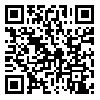Volume 16, Issue 3 (May-June 2017)
Payesh 2017, 16(3): 359-366 |
Back to browse issues page
Download citation:
BibTeX | RIS | EndNote | Medlars | ProCite | Reference Manager | RefWorks
Send citation to:



BibTeX | RIS | EndNote | Medlars | ProCite | Reference Manager | RefWorks
Send citation to:
Soheila Khalili, Mahmoud Tavousi, Lida Moghaddam Banaem. Health Literacy for women with breast cancer (HELBA): development and
psychometric properties. Payesh 2017; 16 (3) :359-366
URL: http://payeshjournal.ir/article-1-109-en.html
URL: http://payeshjournal.ir/article-1-109-en.html
1- Faculty of Medical Sciences, Tarbiat Modares University, Tehran, Iran
2- Health Metrics Research Center, Iranian Institute for Health Sciences Research, ACECR, Tehran, Iran
2- Health Metrics Research Center, Iranian Institute for Health Sciences Research, ACECR, Tehran, Iran
Abstract: (4992 Views)
Objective (s): Breast cancer is the most common cancer among women worldwide. This study was performed to design and assess the psychometric characteristics of a health literacy instrument for breast cancer patients.
Methods: According to existing health literacy measures, a primary questionnaire in five domains of reading, access, understanding, assessment and decision-making was designed. The qualitative and quantitative content validity of the questionnaire were evaluated with the relevant experts and after the necessary modifications, content validity index (CVI) and content validity ratio (CVR) were calculated. Qualitative and quantitative face validity of the questionnaire were evaluated by a number of patients and according to their views, revisions were made and the impact factor (Impact Score- IS) were calculated for each of the items. Next, the questionnaire was completed by 225 women with breast cancer and in order to assess construct validity, exploratory factor analysis was performed. Finally, the reliability was tested by Cronbach's alpha.
Results: A 36-item questionnaire in five domains of reading, access, understanding, assessment and decision-making/behavior was designed. In the qualitative content validity, 2 items were removed and necessary corrections were made for other items. The CVI and CVR of the items were calculated. All items achieved the optimum values and were maintained in the final version of the questionnaire. Also after qualitative face validity, impact factors were calculated for each items and they were all at optimal levels. The results of the exploratory factor analysis showed that the breast cancer health literacy containing 34 items and five subscales accounted for 64.9% of variance observed.
Conclusion: The breast cancer health literacy (HELBA) is a valid measure and now can be used to assess health literacy in women with breast cancer.
Methods: According to existing health literacy measures, a primary questionnaire in five domains of reading, access, understanding, assessment and decision-making was designed. The qualitative and quantitative content validity of the questionnaire were evaluated with the relevant experts and after the necessary modifications, content validity index (CVI) and content validity ratio (CVR) were calculated. Qualitative and quantitative face validity of the questionnaire were evaluated by a number of patients and according to their views, revisions were made and the impact factor (Impact Score- IS) were calculated for each of the items. Next, the questionnaire was completed by 225 women with breast cancer and in order to assess construct validity, exploratory factor analysis was performed. Finally, the reliability was tested by Cronbach's alpha.
Results: A 36-item questionnaire in five domains of reading, access, understanding, assessment and decision-making/behavior was designed. In the qualitative content validity, 2 items were removed and necessary corrections were made for other items. The CVI and CVR of the items were calculated. All items achieved the optimum values and were maintained in the final version of the questionnaire. Also after qualitative face validity, impact factors were calculated for each items and they were all at optimal levels. The results of the exploratory factor analysis showed that the breast cancer health literacy containing 34 items and five subscales accounted for 64.9% of variance observed.
Conclusion: The breast cancer health literacy (HELBA) is a valid measure and now can be used to assess health literacy in women with breast cancer.
type of study: Descriptive |
Accepted: 2017/05/13 | ePublished ahead of print: 2017/05/15 | Published: 2017/05/15
Accepted: 2017/05/13 | ePublished ahead of print: 2017/05/15 | Published: 2017/05/15
| Rights and Permissions | |
 |
This work is licensed under a Creative Commons Attribution-NonCommercial 4.0 International License. |





